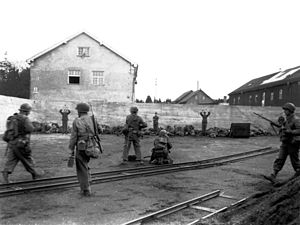Dealing with war crimes by your soldiers
Reading of American soldiers killing civilians in Afghanistan brings horror to anyone. Murder of innocents is what the other side does, not us. Though we kill thousands via bombing and drone strikes, there are no repercussions or trials for killing by remote technology, only fascination and exhibits in the Smithsonian. Our outrage is reserved for those who murder in person.
One day while popping around wikipedia, I ran across an article of American war atrocities in WWII. Inhuman actions by Americans in the war against Japan are well known today, partially due to the lack of quarter given by either side in the ferocious fighting on the islands of the Pacific. The volume of atrocities performed by the Japanese upon prisoners as well as the peoples of Asia overshadow the American acts. Less known are the acts by Americans in the European war. Again the inhumanity of the Germans drastically overshadows American actions, which were in turn less common than in the war against Japan. Nevertheless, I followed links to an article which included the photograph below of the liberation of Dachau which I found familiar from a book I have.
The word Dachau is synonymous with atrocity, for the torture and murder of innocent civilians by the Germans during Hitler's regime. After the war, the murders were attributed to the SS and Gestapo to make a distinction from Germans in general to mollify those alarmed that recent murderers had become our allies against the Soviet Union. But when American soldiers liberated the camp, they murdered a fair number of guards. It was kept silent for a long time. The photograph above was taken by an Army photographer which actually documents the murder.
One day while popping around wikipedia, I ran across an article of American war atrocities in WWII. Inhuman actions by Americans in the war against Japan are well known today, partially due to the lack of quarter given by either side in the ferocious fighting on the islands of the Pacific. The volume of atrocities performed by the Japanese upon prisoners as well as the peoples of Asia overshadow the American acts. Less known are the acts by Americans in the European war. Again the inhumanity of the Germans drastically overshadows American actions, which were in turn less common than in the war against Japan. Nevertheless, I followed links to an article which included the photograph below of the liberation of Dachau which I found familiar from a book I have.
The book I have was published shortly after the war by the US Army as part of their documentation of the war. The caption read:
"CAPTURING GUARDS AT DACHAU, ten miles northwest of Munich. A few of the guards of the concentration camp remain standing with their arms raised while the majority lie on the ground, waiting to be taken prisoner."
The caption in the National Archives for the photograph reads
"Soldiers of the 45th Infantry Division, US Seventh Army, order SS men to come forward when one of their number tried to escape from the Dachau, Germany concentration camp after it was captured by US forces. Men on the ground in background feign death by falling as the guards fired a volley at the fleeing SS men."
Imagine being the guy who wrote those captions after the war. When one looks at the picture, it's pretty apparent what is happening. But he had to type something else and then went home after work, wondering, "What the hell was going on there?"
Much like the Abu Grahib photo scandal, most of the acts were performed by low ranking soldiers. Many had recently discovered buildings full of rotting bodies at the camp and were understandably outraged by what they found. The Army to its credit investigated the shootings at the time, but the report was not made public for 45 years. The Army even considered court-martialing the soldiers and, in contrast with recent events, some of their commanding officers, but General George Patton ordered the charges dismissed when he was military governor of southern Germany. Perhaps worry over how a trial of Americans for murdering prisoners of war would distract from Nuremburg war crimes trials or attempts to encourage Germans to accept the administration of the American occupation zone. No explanation can be found.
It is hard to admit soldiers representing your nation perform heinous acts in war. But war, in it's granting of power over life and death to soldiers and it's total separation from normal life brings out the worst in many people. Were it not for the widespread ownership of digital cameras and camera-phones as well as the accompanying compulsion to take pictures of everything, we would not know of the Abu Grahib mistreatment of prisoners, the urinating on dead bodies, and other atrocious acts by our soldiers today. Had cameras been more commonplace 70 years ago, perhaps we would have a less hallowed image in our minds of our soldiers then.




Comments
Post a Comment